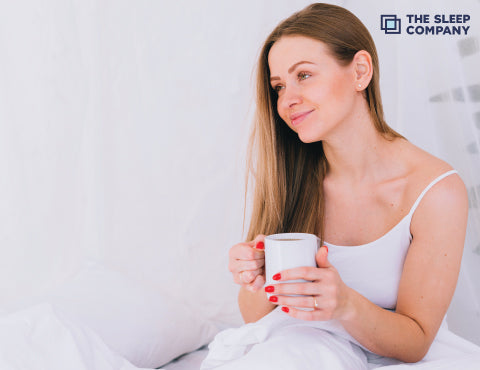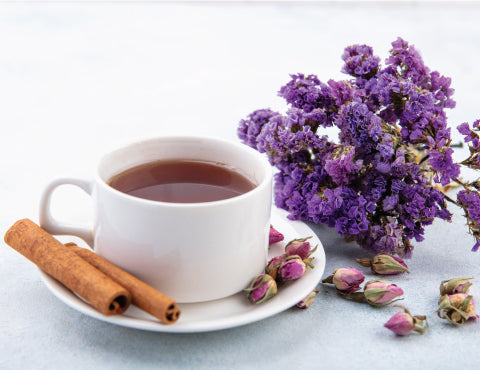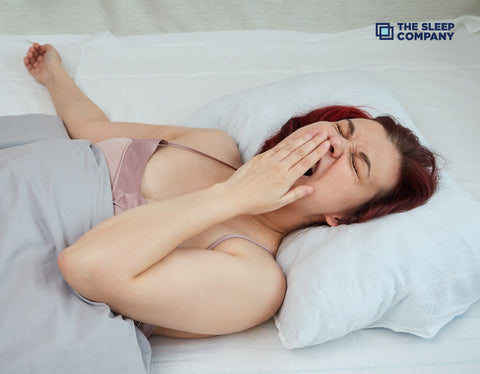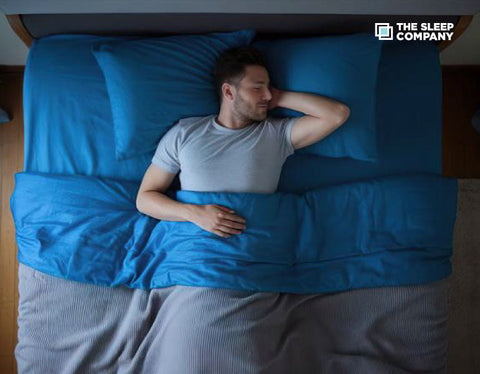My Cart

Can Herbal Tea Put You to Sleep

In India, tea is a ubiquitous part of our daily life. An average Indian consumes 3 cups of tea day. Herbal teas, revered for their calming properties, have stood the test of time as allies in relaxation and promoting restful sleep. Scientific findings substantiate the holistic benefits of herbal teas in alleviating fatigue and enhancing sleep quality. Whether it’s daytime or nighttime under the moonlight, herbal teas emerge as a versatile choice, particularly for those endeavouring to bid farewell to caffeine before bedtime.
Making herbal teas means using edible plants or herbs. There are six special herbs that are really good for sleep and relaxation. When you're at the grocery store, check for these herbs to help you sleep better at night.
Getting a peaceful night's sleep can sometimes feel like a tough task, especially with all the stress and daily challenges. That's where natural remedies, like herbal teas, come in handy. These teas have calming scents and properties that can help you relax and sleep better. From the gentle hug of chamomile to the calming vibes of lavender, these teas don't just taste good, they can also lead you to a peaceful night's rest. Let's check out six herbal teas that might be your ticket to a cozy and refreshing sleep. Take a peek!
Best types of Herbal Tea for Sleep
Chamomile Tea

Chamomile tea is like a warm hug for your senses. Made from chamomile flowers, it's known for its mild, floral flavor. Sipping on chamomile tea before bedtime may help calm your nerves and prepare you for a peaceful night's sleep. It's a classic choice for winding down after a long day.
Lavender Tea

Lavender isn't just for aromatherapy; it makes a delightful tea too. Lavender tea carries a gentle floral taste and is often praised for its calming properties. A cup of lavender tea can be your ticket to relaxation, helping to ease stress and create a serene atmosphere.
Ashwagandha Tea

Ashwagandha, sometimes called the "Indian ginseng," is an adaptogenic herb known for its potential to reduce stress. As a tea, it has a unique earthy flavor. Sipping ashwagandha tea might be just what you need to unwind and find balance, especially during hectic times.
Valerian Tea

Valerian root has been used for centuries as a remedy for various ailments, including sleep troubles. Valerian tea may not win a taste contest with its strong, earthy flavor, but its potential to promote relaxation and help with sleep has made it a staple in the world of herbal teas.
Peppermint Tea

Peppermint tea, known for its refreshing taste, extends its benefits beyond flavor. It can help alleviate indigestion and relax the muscles, making it a great option after meals and an excellent choice for a cozy bedtime routine.
Cinnamon Tea

Cinnamon tea, infused with the warm and comforting essence of cinnamon, not only delights the taste buds but also offers potential sleep benefits. Its aromatic nature can create a soothing atmosphere conducive to relaxation.
When choosing your herbal teas, consider your preferences and any potential sensitivities. Enjoy experimenting with these teas to find the perfect blend that supports your journey to a Peaceful sleep.
| Herbal Tea | Who Should drink it? | Known for | Best Time to Drink |
| Chamomile Tea | Anyone seeking relaxation | Calm nerves, aids sleep | Before Bedtime |
| Lavender Tea | Those looking for tranquillity | Promotes relaxation, reduces stress | Evening or before bedtime |
| Ashwagandha Tea | Individuals managing stress | Adaptogenic, helps reduce stress levels | Anytime during the day |
| Valerian Tea | People with sleep troubles | Promotes relaxation, aids in better sleep | Before bedtime |
| Peppermint Tea | Those with digestion issues | Soothing digestive tissues, refreshes | After meals or any time of day |
| Cinnamon Tea | Individuals managing blood sugar | Regulates blood sugar, adds warmth | Morning or with meals |
Herbal Tea for Sleep: The Merits

In recent years, we've witnessed the surge in herbal tea's popularity. The burning question: is herbal tea the sleep elixir we've been searching for? And does the choice of herbal tea matter? We decided to embark on a quest for answers.
Herbal teas do not contain caffeine
Most herbal teas are caffeine-free, making them suitable for bedtime. Exceptions exist, such as guarana tea and yerba mate tea, which do contain caffeine. Fruity teas may also contain caffeine if blended with real tea leaves. Always check the label if in doubt.
Drinking herbal tea boosts your immune system
Herbal teas rich in antioxidants, such as dandelion, ginseng, ginger, and liquorice root tea, contribute to immune system enhancement.
Herbal tea helps with pain
Certain herbal teas, like fennel, rose hip, turmeric, and green tea, possess natural anti-inflammatory properties that can alleviate various pains, including headaches and migraines.
Herbal teas can help you sleep
Some herbal teas, like chamomile and magnolia tea, contain ingredients that promote relaxation, reducing stress and anxiety levels, facilitating a faster transition into sleep.
If herbal tea hasn't proven successful in inducing sleep, it might be time to inspect your sleep surface. Your mattress plays an essential role in achieving peaceful sleep. If you’re using the same mattress for over 7 years, then it’s time to replace your mattress. You can buy mattress online or visit The Sleep Company store to explore our range of SmartGRID Mattresses and products.
The Benefits of Herbal Tea for Sleep and Beyond
Improve digestion: Strengthen your digestive system and enhance nutrient absorption.
Improve memory: Stimulate brain function, improving concentration and memory.
Enhance energy levels: Some herbal teas provide an energy boost, containing caffeine.
Reduce nausea: Relieve nausea with ginger or chamomile herbal tea.
Lower cholesterol and blood pressure: Certain herbal teas, like green tea, contribute to lower cholesterol levels and stress reduction.
Detoxify: Herbal teas detoxify your body and blood, improving organ function, skin health, and metabolism.
Herbal Tea for Sleep: A Final Word
While the benefits of herbal tea are plentiful, selecting the right blend is crucial. Herbal tea can aid sleep by promoting relaxation and reducing stress, but opting for a caffeine-free blend is essential unless, of course, you're planning an all-nighter.


































































